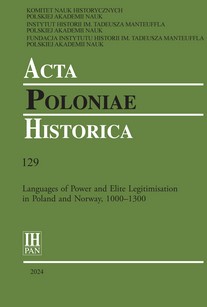MAKING CHRISTIAN RULERSHIP ON THE PERIPHERIES OF THE LATIN WORLD
MAKING CHRISTIAN RULERSHIP ON THE PERIPHERIES OF THE LATIN WORLD
Author(s): Zbigniew Dalewski, Hans Jacob OrningSubject(s): Christian Theology and Religion, Cultural history, Comparative history, Government/Political systems, Politics and religion, 13th to 14th Centuries
Published by: Instytut Historii im. Tadeusza Manteuffla Polskiej Akademii Nauk
Keywords: Ideology; shared rule; kingship; conflict; coronation;
Summary/Abstract: This article explores the introduction and consolidation of Christian rulership ideology in medieval Poland and Norway. Both realms started to be integrated into the Christian European culture around the turn of the first millennium, marked by the introduction of Christianity and the establishment of a kingdom with a Christian rulership ideology imported from Latin Europe. However, the adoption of this ideology and its repercussions were substantially different in the two realms. In both countries, introducing the new ideology increased political tensions, as its notion of undivided power made sharing power a more delicate issue. However, the way that these tensions played out in the two realms differed substantially. In Poland, the new ideology acquired a specific, non-royal dimension, and the result was that Poland was divided into several political entities. In Norway, the new rulership ideology became focused at the rank of kings and promoted sole kingship, which resulted in intense political and ideological struggles. In the long run, however, the ideology of Christian rulership led to consolidated kingdoms in both realms, albeit earlier in Norway (1240) than in Poland (1320).
Journal: Acta Poloniae Historica
- Issue Year: 2024
- Issue No: 129
- Page Range: 65-101
- Page Count: 37
- Language: English

